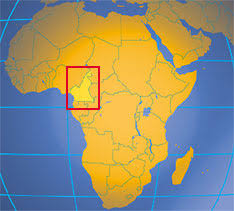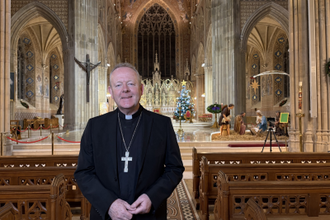Violence in Cameroon prompts action in Portsmouth Diocese and beyond

Requiem Masses will be held across English-speaking Cameroon today (Saturday) for protesters killed at the end of September. A Catholic diocese in the UK is highlighting continuing human rights violations in the West African country.
As many as 30 unarmed civilians were shot by Cameroon's security forces while demonstrating against their exclusion from power in the Francophone-dominated nation. The crackdown follows a year of strikes by lawyers, teachers and businesses. The government's response has been criticised in a declaration by the Bamenda Provincial Episcopal Conference.
The bishops have condemned the "barbarism" of the Cameroonian regime's disproportionate reaction to largely peaceful demonstrations, suggesting it is "a subtle call for ethnic cleansing."
Both Amnesty International and the Crisis Group are urging the international community to press Cameroon's authorities for dialogue to prevent further violence.
Portsmouth Diocese has been twinned with the Diocese of Bamenda since 1974. Over the years Portsmouth has raised more than a million pounds for humanitarian and development projects in Cameroon. But now, the UK diocese is urging the British government to condemn the wave of torture, detention and killing focused on the Anglophone minority in Cameroon.
The Bamenda bishops' declaration challenges the Cameroon government to stop equating peaceful protestors with terrorists. The Archbishop, supported by five bishops, is calling on the government of President Paul Biya, in power since 1982, to abide by the constitution and international human rights treaties to which Cameroon is a signatory.
According to Colm Lennon, Chair of the Portsmouth Bamenda Committee: "As ever it is the children and the poorest who suffer the most in these situations. Already, a full academic year has been lost with little prospect of full resumption in the near future, putting children in the Anglophone area at a huge disadvantage."
Background to the crisis unfolding in Cameroon
Before independence in 1961, Cameroon was administered by the British and the French, in two distinct regions, with different government systems, language and customs. After a contested referendum, the English-speaking regions in the north west and south west (20% of the population) were united with French-speaking areas (80% of the population). A federal constitution guaranteed each group a degree of self-determination. However, the federal model ended in 1972 and power has been increasingly centralised, giving Francophone politicians the upper hand. Over the years, the Anglophone population (five million people) has felt increasingly side lined and economically marginalised. There are approximately 19 million French speakers, and their representatives have the vast majority of positions in government and the armed forces. For instance, only one out of 36 ministers with portfolio is an English speaker.
In October 2016, Anglophone lawyers went on strike, protesting that new laws were never translated into English; courts in Anglophone areas were forced to conduct their business in French; and they had judges who did not speak English foisted upon them. The lawyers were soon joined by teachers and others from civil society, all of whom feel aggrieved at being ignored for decades.
The government reacted by suspending the internet in the Anglophone areas for three months, as it was again at the beginning of October, stopping civil society from organising. The Francophone authorities ordered a disproportionate military crackdown, a curfew, the arrest of journalists and others, the reported torture of dozens of activists and, according to Amnesty, the deaths of 17 people. The International Crisis Group suggests as many as 30 people died. Although the government agreed to some Anglophone demands, many in the English-speaking areas believe it is too little, too late.
Bishops have been harassed by the government because of their role in civil society. In addition, Christians were teargassed on their way from Mass on Sunday October 1st, even though they had been given exemption from the general curfew in order to attend church. The bishops are especially concerned that the government portrays any dissenting citizens as terrorists, equating them with the Islamist Boko Haram militia which threaten the far north of Cameroon.
When asked about the UK government's attitude in May, the then-Africa minister, Tobias Elwood, told Jim Cunningham MP in a letter that the UK stood by the disputed referendum that took place on independence. The UK is urging a peaceful resolution. The French Foreign Ministry has issued a similarly bland plea for all concerned to resist violence. Unfortunately, for the Anglophone population, such moral equivalence ignores both the disproportionate force used by the Cameroon government, and assumes both sides (armed forces against unarmed civilians) are equally to blame.
The government's actions have fuelled calls for secession, and the bishops fear a tense and volatile situation may deteriorate further. Their supporters in Portsmouth hope that the Foreign Office will give a more robust defence of the Anglophone population, given Britain's historic links with Cameroon.
Read more about the twinning project here: www.bamendaandportsmouth.com/index.php


















